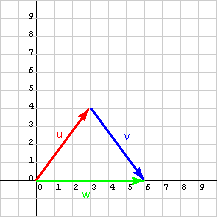A good answer might be:
Plugging into the formula:
| g | =( 12 + 12 ) =
2.0 = 1.414213562373
Notice that the length is NOT 1.0, nor 2.0. People sometimes make that mistake.
If g = (1, 1)T, what is | g | ?
Plugging into the formula:
| g | =( 12 + 12 ) =
2.0 = 1.414213562373
Notice that the length is NOT 1.0, nor 2.0. People sometimes make that mistake.
Remember from the previous chapter that the length of the sum of two vectors is less than or equal to the sum of the lengths of the two vectors:

| length of ( u + v ) <= length of ( u ) + length of ( v ) |
In our new notation:
| | u + v | <= | u | + | v | |
Consider the vectors represented by:
u = (3, 4)T v = (3, -4)T w = u + v = (6, 0)T
The picture shows how the triangle inequality works for this example. But does it work numerically?